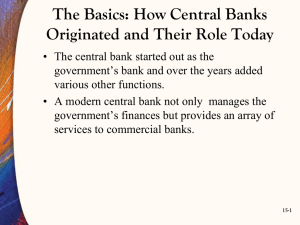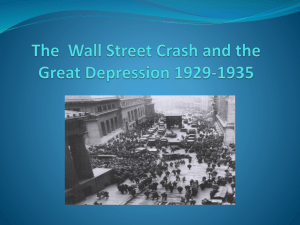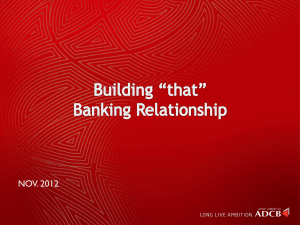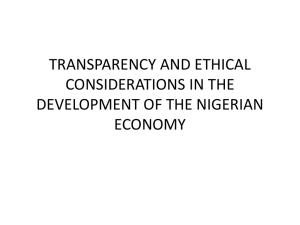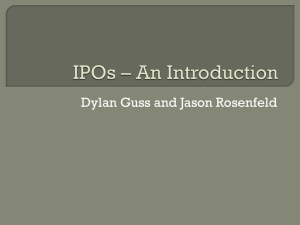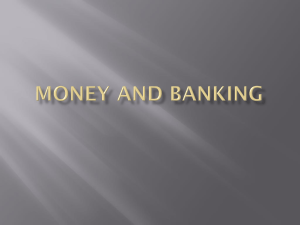Annual OECD CSR Roundtable on Corporate Responsibility The
advertisement
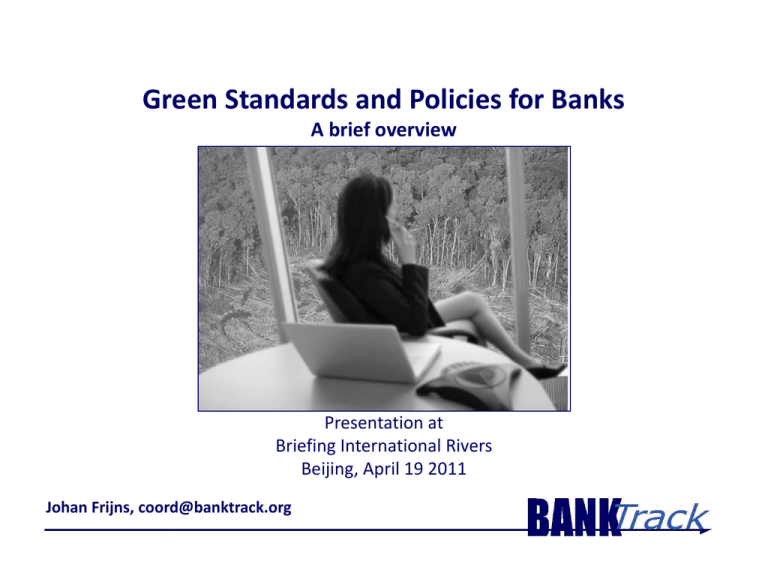
Green Standards and Policies for Banks A brief overview Presentation at Briefing International Rivers Beijing, April 19 2011 Johan Frijns, coord@banktrack.org 提纲 Outline 1. About BankTrack (银行监察组织的简介) 2. Why do we need Green Finance? (society, banks) 3. Where to start? Standards and guidance for banks -> Next sessions at GP training – what NGOs can do to push banks forward Global NGO network: 36 members and partners 银行监察组织是由全球36个民间机构组成的网络 Each with specific focus 关注多种多样的议题 Dams 大坝 Corruption 贪污腐败 Cluster bombs Large mines 集束炸弹 大规模采矿 Nuclear power 核电站 Human rights 人权 Targeting the bank behind the problem is smart strategy 把倡导目标指向问题背后的银行是一个聪明、有力的策略 How do we impact on banks? “4T Approach” Track Trouble Talk Tell We are facing a huge challenge 其挑战很大…. …things are not so well lately.. 并且最近的情况不是很好…. Banks operate in a world facing multiple, interconnected crises water crisis 水资源欠缺 climate change globally organised crime, drug wars 气候变化 vanishing species vanishing forests 森林破坏 生物的灭种 Overfishing 过度捕鱼 Pollution污染 conflict and war hunger, poverty 粮食缺乏 population growth, mass migration exploding cities 大规模的城市 人口增长 Land shortages 土地冲突 “Banking; a clean, high tech service industry minimal environmental and social impact” “银行业看似是一个干净、高科技产业,其环境和社会影响较低” Banks DO have a choice; be part of the problem.. Or mobilise capital for real solutions to the crises With real win win benefits for banks • New Business Opportunities Do no harm is not good enough, do well Better Risk management Strong Reputation • Bank as responsible part of society Transparency, accountability Profit through long term Value creation Strong Bonds with clients There is value is doing well Savings through efficient operations • Doing well must be organised Proud employees “Okay okay, we are convinced; now what?” Formulate Ethics and Values Develop Business Strategy 伦理与价值观 商业策略 Rethink Risk vs Opportunity 风险与机会 Design and adopt appropriate policies that fit mission Good policies: 1. Start from explicit mission and vision of bank on role in society 2. Provide criteria for which clients to do business with, and which not.. 3. Provide criteria on what business to engage in, and what not.. 4. provide stringent criteria on client conduct in operations to be financed 5. Spell out responsibilities of banks themselves 6. grant rights to, and respect rights of, other stakeholders, genuine influence in process 7. Seek transparency of process 8. Include guarantees for accountability, external review 9. Contain arrangements for dealing with grievances and problems 10.Seek societal benefits next to bank / client benefits Tools available – no need to start from scratch 1. International laws and treaties 2. UN/OECD led initiatives 3. National law – best practices 4. Civil society / business joint initiatives & standards 5. Bank / Business initiatives 6. Bank policies – best practices 1. International Law and Treaties UNFCCC / Kyoto / Durban… Convention on Biodiversity UNDRIP Convention on Chemical and Biological weapons • government obligations, but banks, like everybody, need to work towards fullfillment of treaties • human rights norms for non state actors, business Protect, Respect and Remedy framework • universally accepted norms, not Northern standards 2. UN/OECD led initiatives • Initiatives of UN agencies or OECD • part cooperative efforts with business • ‘Standards’ on labour, human rights, environment OECD Guidelines for • ‘Soft law’ or voluntary commitment, but evolving Multinational • Mixed impact on activities business and banks enterprises • For NGOs reference in campaign work UN Principles for UNEP finance initiative Global Compact 全球契约 Responsible Investment 3. National laws and best practices China - Green Credit policy Belgium - law on investments cluster munition Netherlands – banking code on bonus payments • National laws setting standards on investments and bank performance Norway – human rights regulation national petroleum (pension) fund • Example for banks designing policies for their own investments 4. Civil society / business joint initiatives & standards • Multi stakeholder initiatives • Often started by civil society groups • Standards for sectors or on issues • Certification schemes • Possible criteria for investors/lending 5. Bank / business initiatives • Initiatives of banks on specific challenges • Industry associations develop standards for sectors • often response to civil society but no involvement • guidance for investments and project design • yardstick for campaigners 6. Individual Bank policies Where it is all ending up • All standards and norms need translation on bank level to have any impact on lending and investments • Some banks already set standard, best practice • other banks can follow practice, or adopt as group No financing • NGOs can push banks towards better policies of tar sand oil projects Partial retreat from coal power plants Stringent human rights policy Ban on investments arms 5. Will it taste good? • Not without the Soul Within (mission, ethical vision) • Not when just following the recipy (tick box mentality) • Not when using poor ingredients (poor implementation) • Not when recipy is kept secret (no transparency) • Not when eaten alone (no stakeholder involvement) • Not when eaten outside in sand storm (crisis, regulation) How to get banks there? To discuss further during finance training tomorrow… Thank you! www.banktrack.org Johan Frijns <coord@banktrack.org>

